|
Grandma's Dandelion Tea
|
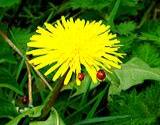 | 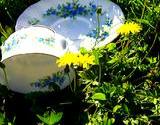 |  |
The word dandelion comes from "dent de lion," which is French for lion's tooth-a reference to the plant's sharply pointed leaves.
Despite its fearsome name, dandelion is beneficial to the body and is used in many medicinal teas. In fact, the entire plant, including its strong taproot, can be used to make herbal tea. The root of the dandelion is known to contain countless active ingredients, including potassium and calcium. Both the leaves and roots of the plant have bitter constituents, which have a stimulating effect on the body.
Caution All parts of the dandelion plant contain a milk sap. Those allergic to dandelions should be especially careful not to come into contact with this sap. Most others, however, can tolerate the sap when it is applied to their skin.
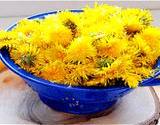 | 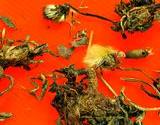 | 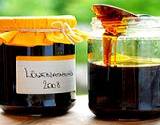 |
Healing Dandelion Tea Recipes
Basic Dandelion Tea
Because it grows wild in most parts of the world, dandelion is easy to collect yourself. Harvest plants growing as far as possible from the high-traffic streets; avoid plants growing in lawns treated with herbicides or parks that have a regular traffic of dog walkers.
Small early-spring leaves make a less bitter herbal tea. Pour 1 cup of boiling water over 1-2 teaspoons of dried, crushed leaves; steep for about 10 minutes. Drink 1 cup of this tea 2 times a day.
Digestive Problems Herbal Tea
- 1 ounce dandelion root
- 1 ounce dandelion leaves and stems
- 2/3 ounce fennel seeds
- 2/3 ounce peppermint leaves
Steep this mixture in 1 cup of hot water for about 10 minutes and strain. This medicinal tea combination helps stimulate bile production, promote digestion and alleviate intestinal gas.
Caution Never give children an herbal tea with peppermint. The menthol in the peppermint could have an adverse reaction.
Medicinal Tea Ideal for Skin Cleansing
- 2/3 ounce dandelion root
- 2/3 ounce dandelion leaves
- 2/3 ounce nettle leaves
- 2/3 ounce red clover blossoms
- 2/3 ounce rose hips
Steep this mixture in 1 cup of hot water for 10 minutes and strain. You will need to drink a cup of this tea daily for several weeks before the skin-clarifying effect becomes evident.
Dandelion Tea for Fluid Retention
- 1 ounce dandelion root
- 1 ounce dandelion leaves
- 2/3 ounce nettle leaves
- 2/3 ounce spearmint leaves
Steep this mixture in 1 cup of water for 10 minutes and strain. This tea aids metabolism and stimulates the activity of the kidneys, thereby reducing bloating and fluid retention.
Dandelion Tea Medicinal Remedies
The invigorating effect of dandelion is due to its bitter constituents. The root also contains fermenting agents, enzymes and abundant vitamins and minerals. This combination of ingredients can help purify the blood, act as a diuretic, improve metabolism and bile production and strengthen the stomach, as well as help in treating symptoms of arthritis.
Digestion Remedy
While dandelion tea can help ease chronic liver and gallbladder problems, it can also improve daily digestive processes. Taken after a meal, it helps stimulate the entire gastric biliary tract and pancreatic systems. It is also a good idea to drink dandelion tea after eating foods with a high fat content. The tea will relieve indigestion.
Natural Spring Tonic
The medicinal effects of dandelion and nettle leaves make a tea with these herbs excellent for rejuvenating the body after a long winter.
Dandelion Tea Stimulates a Child's Appetite
Dandelion tea can improve appetite in children. Because children often dislike dandelion's bitter taste, try adding dried apple pieces or orange slices to the tea. Honey, instead of sugar, can be added for additional sweetness. Read the surprising Benefits of Honey information. Have your child drink ½ cup of the tea 30 minutes before meals.
Old Fashioned Folk Remedy for Kidney and Bladder Stones
Eliminate small kidney and urethral stones with this folk remedy: Pour 1 pint of water over 2 tablespoons of dandelion leaves and 1 teaspoon of nettle leaves. Steep for 10 minutes and strain. Dilute with 1 quart of hot water and drink within half an hour. Repeat daily until the stone has been passed. It is best to continue the treatment once a week to help prevent the formation of new kidney and bladder stones.
Handy Remedy for Kicking the Coffee Habit
Clean dandelion roots and cut them into small pieces. Dry them in a warm oven, 150 degrees, with the door open about 2 inches to allow the air to circulate. Then roast the roots in a pan at 325 degrees until brown, turning frequently. Grind them immediately. Use 1 teaspoon to brew 1 cup.
How about a Mild Bitter Cordial?
Remove a handful of fresh flower buds from a leafy plant and steep for 1 week in about 1 pint of clear grain alcohol and strain. Dilute 1 teaspoon of cordial in herbal tea and take after meals to stimulate digestion.
DISCLAIMER:
The statement's made here have not been approved by the Food and Drug Administration. These statements are not intended to diagnose, treat or cure or prevent any disease. This notice is required by the Federal Food, Drug and Cosmetic Act.
Return from Dandelion Tea Recipes to Grandma's Medicinal Teas Guide
Return to Grandma's Wisdom Home





